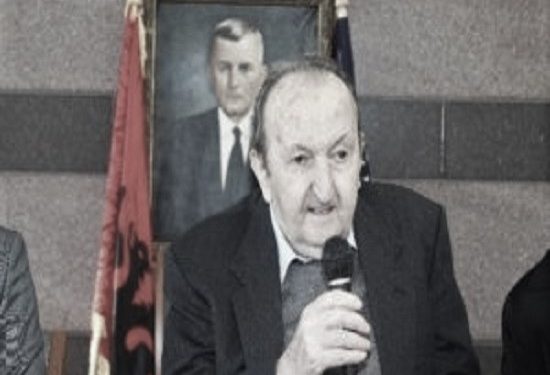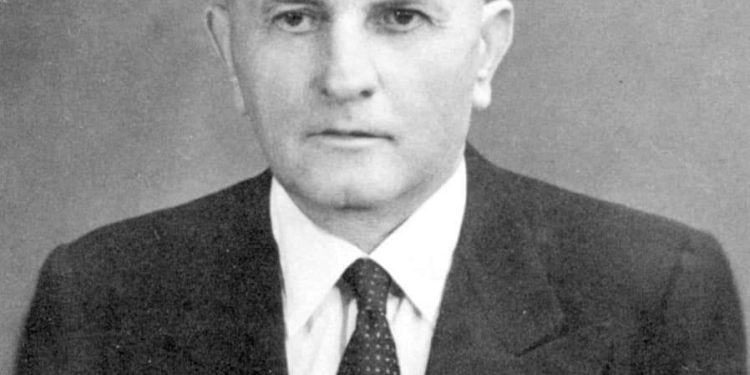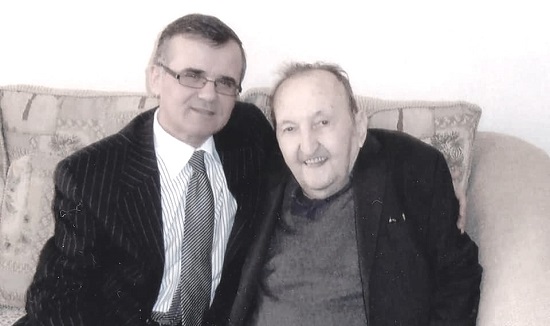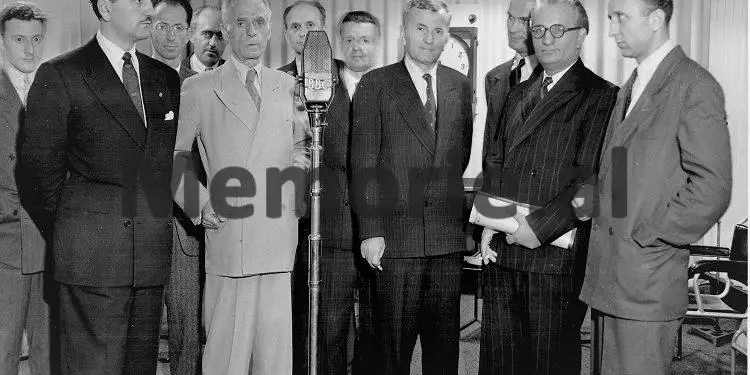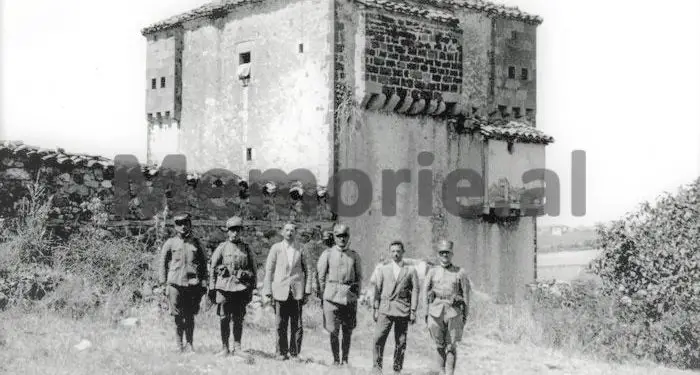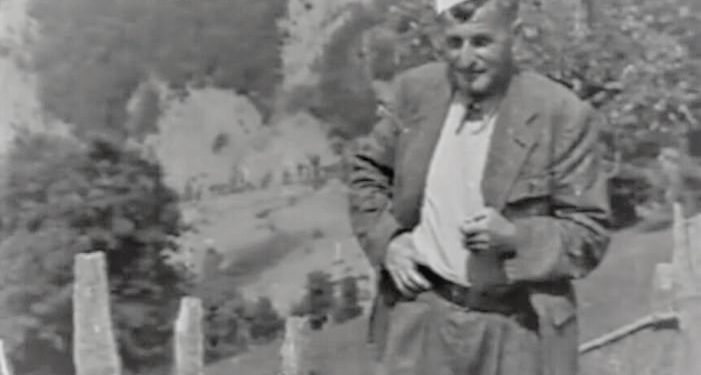By Dalip Greca
Memorie.al / Fatbardh Kupi, the only son of Abaz Kupi, who remained in Albania, was not lucky enough to lend a hand to his father. He experienced his father’s act, that April 7, 1939, with pride. But every time April 7 “knocked”, inside he felt the pain that caused him the fear that he could not tell his father: “Father, I do not weaken, I do not regret the suffering during 45 years in communist prisons and internment camps. We have done everything consciously, because it was worth suffering for a father-hero. – I would like to tell him one more thing: Father, I kept the promise I gave you when we separated….”! I met Fatbardh, the son of Abaz Kupi, who remained in the hands of the communists along with his mother and sisters, a long time ago. We had set up a meeting at the restaurant “Dani’s House of Pizza”, located in Kew Gardens in Queens.
We had specifically chosen the place where the hero of the April 7 resistance, Fatbardhi’s father, Abaz Kupi, had spent most of his later life. There was also a third person at the meeting: Ndrec Gjergji, who had often been in Abaz Kupi’s company. Fatbardhi was sitting right at the second table, by the window, looking out at the street and seemed lost in contemplation of the landscape. With his gaze lost in space, I found him as I entered after a traffic delay. – “Here was Abaz Aga. He would come in the morning at 9 o’clock, drink coffee, exchange the latest news through conversations with his colleagues, around 10 o’clock, he would go for a walk in the nearby park and return around one o’clock in the afternoon”, – Ndrec Gjergji recalls the distant time….! Fatbardhi, there is a light in his eyes wet with tears, while in my dictaphone, the plaintive sound of that story full of longing for his father is preserved.
That is how I have always seen his eyes, wet with tears and illuminated by a special glow, where pride and the pain of the hostage are mixed. This happens to him every time he talks about his father, Abaz. I remember a moment when the veteran legalist, Enver Shaska (feelings are pure), brought a memory from Abaz Kupi at the time of his escape from Albania, Bardhi’s eyes lit up with the pleasure of hearing good things about his father. When I tell him that I will write something about Fatbardhi’s suffering in prisons and internment camps, he utters a; “Noooo”, prolonged. It is not the first time I have made this proposal to him, but he again firmly objects: – “Please, do not make this request again; I am too small in front of my father. Throughout my entire life I have lived with the pride of being the son of the one who put his chest to the war in Durrës and welcomed the fascist invaders with war. My sufferings are small in front of the greatness of my father. I write about him, because it eases my pain and longing”. I obey his decision.
Peter Kemp, Abaz Kupi fought like a lion against the Germans!
On the table, in front of his hands, Bardhi holds the book by the British Peter Kemp “No Colour or Crest”. He feels happy that the British have managed to give the greatness of his father, contrary to the communist historiography, which denied the hero not only his contribution to the war against fascism and Nazism, but also the resistance of April 7. Bardhi flips through and stops somewhere on page 142 of Peter Kemp’s book, where the Britisher expresses surprise at how Enver Hoxha, even though he was not present in the German fighting during the attack on Krujë, denied Abaz Kupi the weight of the war in this battle. For Peter Kemp, Abaz Kupi fought like a lion to save his beloved Krujë, while, he writes, neither Haxhi Lleshi’s partisans nor the Italian formation, which after surrendering and joining the Albanian forces, had decided to fight against the Germans, did so.
The British uses the exact word “lion” to describe the way Abaz Kupi fought in that battle. The Germans tried to crush Abaz Kupi, the chief defender of Kruja, with artillery, but he stood and led his brave men like a hero. Peter Kemp testifies from the war front. He also brings another detail, that during the bombing; Abaz Kupi’s sister-in-law lost her life. And how could Abaz Kupi not fight against the Germans, where he fought inside his own house? He defended the life of his family, of his homeland?
It was in the interest of the communists not to recognize the participation in the battle against the Germans, the hero of April 7, because Enver Hoxha wanted to align all nationalists on the side of the invaders, to claim for him the attributes of the liberator and did not accept to share the cake of power with others. It was the same Enver Hoxha who, in the bulletins of “Zërit të Popullit”, wrote with enthusiasm that “Bazi i Cane, fights like a lion and no one can subdue Albania with such heroes”. But later, when Mukja showed who the nationalists were and who the internationalists were, Abaz Kupi was declared an “enemy” by the communists and they denied him the war!
Abaz Kupi, pillar of the war
Abaz Kupi’s war merits cannot be denied. The communists tried to overthrow his myth in Albania, but they could not, the democrats must do more to exalt the figure of this hero, who laid his chest on the enemy. Abaz Kupi is not one of those heroes who rise today and fall tomorrow. He has won eternity with his own act. He had grabbed the rifle since he was 15 years old. While at the moment of April 6, 1939, when he received the order to face the attack of the fascist hordes in Durrës, he entered the history of Albania, with both feet. In front of tens of thousands of fascists, he had under his command only 500 gendarmes in regular uniform and 500 volunteers, who were nothing more than his followers.
With these one thousand fighters, the one whom the royalists call, “General Abaz Kupi”, while the English, “the Albanian hero” organized the defense of Durrës. This is how David Smiley describes him, this is how Julian Emery describes him, in “Sons of the Eagle”, as well as Peter Kemp in his book “No colour or Crest”. In a letter that Abaz Kupi sent after the war, to the British Foreign Minister, Anthony Eden, he describes his resistance during the war with facts that the communists tried to deny. He describes the resistance to the fascist attack in Albania as follows:
“When the enemy ships arrived near the mole, I let the fascists land, even approaching us by about 200 meters. Then I gave the order to open fire on them. Thus, at 4 o’clock in the morning, a real battle had begun. During these battles, we repelled their three successive attacks, forcing the aggressors to turn back and re-enter their ships. During the fourth attack, the enemy, using all his means and combat forces at his disposal, concentrated on a general attack against our right flank. In the meantime, we, not having the necessary means during 6 hours of bloody and uninterrupted fighting, were forced to retreat.
It must be said that during this time, our artillery severely hit two of the enemy ships, where his soldiers were crowded there closely, in which case the enemy lost many killed there. In these circumstances I left my country and went to Yugoslavia, where I met with Colonel Oakley Hill and other British officers, my colleagues, with whom I have had many occasions of cooperation”. Abaz Kupi would not stop his efforts to organize the anti-fascist resistance. His heroism does not end in Durrës. In 1941, together with the English Colonel Hill, Gani Kryeziu and Abaz Kupi and his company, re-entered Albania from Yugoslavia, to continue the war. The direction was towards Shkodra.
After efforts in Tropoja, they managed to reach Bogë. The capitulation of Yugoslavia caused them to turn back and stay in the mountains of Gjakova. Colonel Hill preferred to stay with Gani Kryeziu, while Abaz Kupi went deep into Albania to organize resistance against the fascists. Abaz Kupi became a terror for the fascist militia, which committed more than 2 thousand forces to capture him. The number of fighters who followed Abaz Kupi increased every day. He was one of the main factors of the war; he was one of the pillars that supported the resistance. In 1943, his forces surrounded an enemy battalion in Burrel.
The siege was a tightly tightened pincer, which did not let go of the enemy, to whom another heavily armed regiment was sent from Tirana to help. Abaz Kupi’s forces also surrounded this regiment, which was holed up in the Mat Mountains for a long time. The fascists left many dead in this siege. The other forces that the occupiers sent from the Qafë Shtama side to come to the aid of the besieged also left many dead and wounded behind. Abaz Kupi’s forces fought another battle, three weeks later, in Suç i Mat. It is true that there were dead and wounded among his ranks, but the enemy published in the war bulletin after the battle, 170 of his own ranks was killed, while the rest surrendered. After this, the fascist forces retaliated in Mat, where they burned down many houses of Abaz Kupi’s supporters.
When the chronicles of Abaz Kupi’s battles were echoed outside Albania, the allies took the English major Niel to his headquarters. Together they prepared a plan to take Kruja from the Germans. The war lasted three days and the Germans suffered heavy losses. On the third day, numerous Nazi reinforcements arrived, and Abaz Kupi withdrew his forces to the heights of the mountains. Then General Davies arrived at his headquarters, along with Colonel Nichols. After the conversation, they decided to resume guerrilla fighting. A joint project was also drawn up, to extend the resistance to Debar, Kosovo and throughout Central Albania. General Davies and Major Nichols were to be accompanied by Abaz Kupi in this agenda. Unfortunately, this project was not realized because the general had fallen in the attempt and was captured, while Nichols had frozen his legs.
Abaz Kupi led a team of brave men to Nichols’ aid and managed to pull him out of the Mat Mountains. He placed him in the house of a friend of his and took care of the English friend himself, providing him with all the conditions and finding a surgeon for the leg operation, but unfortunately Nichols could not afford it, he died and was buried near the house of a friend of Abaz Kupi. Following the events of the war, another Englishman, Colonel Bill Maclin, arrived at Abaz Kupi’s headquarters. In collaboration with him, Abaz Kupi decided to take over the guerrilla war, on a wide front from Kosovo to Pogradec. At Colonel Maclin’s disposal, Abaz Kupi placed a large detachment of 300 fighters, placing at their head a proven colonel and his son, Petrit Kupi. Everything was financially covered by Abaz Kupi himself.
This group, also assisted by English officers, carried out many acts of sabotage to paralyze the invaders. A sensational action is the blowing up of the Gjolje Bridge and many actions against the Germans along the coast of the Sea, where German columns were attacked, and cars were burned and Germans were killed. Abaz Kupi did not take the promises made by the allies and faced the war with his own finances, and as Julian Amery writes, he even supported the English mission with money. Abaz Kupi waited for the landing of the allies, but in vain, the landing did not take place as promised. Under these conditions, in agreement with Colonel Maclin, Majors Amery and Smiley, he decided to disperse his forces and leave Albania. He took with him his two sons, Petrit and Rustem, while leaving the youngest, Fatbardhi, to take care of the remaining family.
Besa and the pledge of his son, Bardhi
Fatbardhi remembers like now his last meeting with his father, who had called him and conveyed the decision he had just made: – “I am leaving for a while. You, Bardhi, go home and stay with your mother and sisters”. Bardhi, who still did not know about the decision to leave, asked him; “but why should I return home? I am not a child…”! Calmly, his father returned with measured words: – “They need protection and I am entrusting you with this task, because I trust you”. After that, his father took out a letter and asked him to sign a declaration of faith there, that he would never abandon his mother and sisters.
Without fully understanding what was being asked of him, the 17-year-old boy replied: – “When I get bored, I will leave sometimes, because I cannot stay at home with women for long”. The father insisted that he should not move without his notice and that he should take care of his mother and sisters, Dudina, Hyria and Bukuria. He even asked him to sign the oath through a declaration and give his husband’s word. After the letter was signed by his son, it was folded in four and the father put it in his wallet. The letter had only one sentence, Bardhi recalls:
“I will not leave the family without notifying me, father”….! Below the signature. When he came to America, after going and crying for a long time at his father’s grave, Bardhi asked if anyone knew anything about the letter that his father kept in his wallet, but unfortunately he could not find any traces of it. This had weakened Bardhi. That piece of paper kept him spiritually connected to his father, during the difficult times in the cold cells, in the death galleries, or during the endless suffering in the internment camps.
When did Bardhi get provoked about his father?
When Abaz Kupi had taken the path of leaving his homeland and crossing the Adriatic Sea, Bardhi’s fate was destined for suffering. But let’s follow his fate. For a short time, Fatbardhi, who had not yet turned 18, ended up in the ranks of the partisans. The story went like this: Abaz Kupi had become a brother to Gjin Marku’s father. Abaz Kupi had maintained Gjin Marku’s family for a long time. He even took Gjin Marku to school and supported him. After Abaz Kupi had fled, Gjin Marku, at the head of the 6th Partisan Division, arrived in Shkodra. He went and met Bardhi’s mother and asked her to take her son with her. He told the mother: – “I am taking Bardhi with me, because I do not know what is happening to him. He is a young boy. I am afraid that if I leave him here with you, he will either be killed or imprisoned.”
And Bardhi joined the ranks of the Partisan Division, with the support of his family friend, the division commander, Colonel Gjin Marku. He remembers that he responded to the provocations and harassment that came his way face to face. When the senior officers told him; “Kadri Hoxha will catch and kill your father”, or; “I will bring him here tied up”, he remained cool-headed. But when the provocations were increased with questions such as: “What about you, what will you do when we kill your father”? He answered with the courage of a teenager – “If you kill my father, I, Enver, will kill Koçi Xoxen”! It seems like a head-scratcher…, but such was the reaction of an 18-year-old, raised under the legends of his father’s bravery.
He did not follow in the footsteps of the Partisans for long!
While Gjin Marku’s Division crossed the border and went to Višegrad, Bardhi, seriously ill, was hospitalized. After recovering, he received a medical report for health disability. However, the report had to be signed at the Shkodra Corps. He went to the command, where he found Shefqet Peçi and Beqir Balluku. Without their signatures, he could not be released; they would consider him a deserter. The secretary was a scoundrel, the uncle of Sami and Gani Kupi, his cousin. The war mixed people up…! He prepared his leave based on the report, which had to be signed by either the commander or the commissar. When he enters the office, Commander Shefqet Peçi provokes him about his father, swearing at him. Bardhi retorts and… The debate escalates. Beqir Balluku, who avoided the fight, intervenes. He took the report and signed it, shouting loudly: “Go home now”! – “This manliness was done by Beqir Balluku, I don’t know where he started, but I won’t forget him, he saved me because Shefqet was hot-tempered and bloodthirsty”, Bardhi recalls that incident from a distant time.
June 9, 1945 – he is arrested as an “enemy of the people”!
Fatbardh Kupi is one of those who have resisted the dictatorship. He experienced the investigation cells and prisons at a young age. He was imprisoned twice, and was exiled for 30 years, but he was not broken. – “If someone had forced me to sign for collaboration, I wouldn’t be alive today, neither I, nor the one who would have managed to get my signature”, – says Bardhi, looking me in the eye with a completely clear look. Fatbardhi experienced internment during the fascist occupation, after the resistance of Abaz Kupi. Initially in the Porto Palermo Castle in Himara, then in Italy. The communist dictatorship could not offer him a peaceful life, on the contrary, it put him through the teeth of the dictatorship. He stood and defied it. But how did the first arrest come? Germany had fallen; World War II had come to an end. Celebrations began in Krujë as well as throughout Albania.
Bardhi had the entire arsenal of weapons at home; the disarmament campaign had not yet begun. He remembers how the weapons were emptied and bombs were thrown, as the whole city was shaken by the explosions. However, six bombs did not explode and posed a danger to the residents. The soldiers began to shoot them to explode. They could not explode because they could not hit the target. He said to a nearby soldier, will you give me the rifle? He gave it to him and Bardhi took aim.
With each shot, he exploded a bomb. He exploded six. The one who gave him the rifle shouted loudly – “Don’t think twice, brother, this is a joke. Kupi’s rifle house! An oak tree grows under an oak tree”! This made someone jealous and spied on, and in these circumstances Bardhi’s first arrest came. It was June 9, 1945, when he ended up in the torture cells. The prosecutor in the indictment accused him of having mobilized the people in the ranks of Legality, collaborating with the youth of Balli, and being among the enemies of the people.
Petrit Hakani sentenced him
His mother and sisters were interned in the Tepelena camp, which is well known for its inhumane conditions, otherwise known as the death camp. Death claimed many innocent lives in that extermination camp. Bardhi stoically faced the suffering of prison. After serving his sentence, he was interned in Porto Palermo, another hell of the dictatorship. After 6 months, he returned to the infamous Tepelena camp, where he stayed for a year. When I ask him what he remembers from Tepelena, through sadness, he utters only one sentence: “When we took the bowl of soup, we would clean the worms and then eat what was left.” I recall the case when a mother insisted on staying in the camp on a cold winter day, not going to work, because her daughter was sick, but the police dragged her away and forced her to go to work. The poor thing was left with a headache. When she returned, she found her daughter dead.
After Tepelena, Bardhi was interned in Çorovodë, Skrapar, in a camp with barbed wire and there. They worked there like slaves. The ordeal never ended. Wherever there was construction, they took the “sons of the enemy”. Then they sent him to the brick factory in Tirana. After the wire camps were removed, they sent him to the field camps of Myzeqe. First to Pluk. After that, they interned him in a camp inside the prison in Radostinë, where they kept him until 1958, then came the next internment in Kuç. When the new internment sector in Gradishte was opened, they interned their family there. Later, Bardhi was also interned there. He was arrested for the second time in 1981. The arrest came without any reason. He was accused because he had stated that; “Enver’s Party has denied the rights of father Abaz Kupi, who fought against the enemies of Albania.”
That was enough to convict him of agitation and propaganda against the party and the government. He remembers the staged trial. The false witnesses, who when he came out of prison, were crying and apologizing. As evidence, an expert report on the draft written by him while he was attending high school at night was also attached. The trial was a farce. As he remembers now, when one of the witnesses, G. V., told him that; the greatest disgrace in his life was to appear as a false witness in the trial against Bardhi, but they had forced him. The entire trial was staged. He was sentenced to 10 years in prison. He spent hard time in Ballshi prison. Later he would try Qafë-Bari, Bulqiza, etc.
With memories of his father, meeting Father Anton Arapi in prison
Even in the most difficult moments of his life, Fatbardh Kupi was nourished by the greatness of his father’s work. He recalls his first imprisonment: “When I was in prison, Father Anton Harapi called me; Come, you son of Bazi… let’s play a game of chess together! In fact, he played chess brilliantly, but I also enjoyed it. I got up and went to his cell and prepared the chess pieces. When the pieces were placed and the game was ready to begin, Father Anton Harapi told me: I didn’t call you to play chess really, but I called you to tell you that you had a brave and wise father. Try to be like him! Be careful, protect yourself”.
Then Bardhi asked him: – “Have you known my father”? He replied: “Of course not! I have met him. Before I met him for the first time, I thought I was just meeting a rascal, one of those warriors who simply throw a rifle in their arms and know how to fight and that are it. But, after the meeting, I felt very happy that I had met a shrewd, wise man, with natural intelligence. Since he spoke, he thought for a long time, but he never dropped it”! Bardh Kupi kept this conversation like a talisman within his soul, even when he was tortured or provoked, and it gave him courage. He felt proud that a Eurydicean like Father Anton Harapi, had parted with the best thoughts from the meeting with his father. After the collapse of communism, the researcher Uran Butka, had told Bardh that Father Harapi had expressed the same opinion in a letter to Lef Nosi. Bardh felt good again because he had this opinion of Father Antonin from two sources.
Former prison comrades, Lek Mirakaj and Esat Çoku, portray Bardhi as invincible in the suffering of the dictatorship. – “He preserved his father’s good name. Only a strong character remained invincible in the face of heartless torturers”, says Lek Mirakaj. – “Bardhi is a noble man. He was often in danger in prison. He was provoked many times, but he did not fall into the trap. There were provocateurs who suggested that he escape from prison, but Bardhi remained silent, and did not even go to denounce them. He intuitively understood that they were involved and if he entered into that adventure, bullets would await him”! The late Bardh Kupi passed away on February 23, 2016, at North Shore Hospital – Long Island, New York and was accompanied with honors by the Albanian community on February 27 at the cemetery where his Father, the Hero of April 7, also rests, on Kew Gardens Road Kew Gardens Queens, New York. Memorie.al




